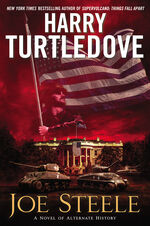| ||||||||||||||||||||||||||||||||||
James Aloysius "Jim" Farley (May 30, 1888 – June 9, 1976) was a New York Democratic Party politician. He was one of the first successful Catholics in American politics, acting primarily as a kingmaker. Serving as campaign manager for politician Al Smith's 1922 gubernatorial campaign and Franklin D. Roosevelt's 1928 and 1930 gubernatorial campaigns, as well as FDR's Presidential campaigns of 1932 and 1936. He was responsible for pulling together the New Deal Coalition of Catholics, labor unions, African Americans, and farmers for FDR. Farley, and the administration's patronage machine he presided over, helped to fuel the social and infrastructure programs of the New Deal. He also served as Roosevelt's Postmaster General from 1933 to 1940. Farley opposed Franklin Roosevelt breaking the two-term tradition of the presidency. He also had aspirations to the presidency himself, which were dashed by FDR's efforts to have himself "drafted" for another run in 1940.
After resigning from the Roosevelt administration in 1940, Farley was named Chairman of the Board of the Coca-Cola Export Corporation, a vehicle created exclusively for his talents. Farley held this post until his retirement in 1973. Farley and Roosevelt backed different candidates for the Democratic nomination for New York governor in 1942, with Farley's candidate winning. Farley once again became an important national political force when his old friend, Harry Truman, became President with the death of FDR. Farley remained active in state and national politics until his death at aged 88, on June 9, 1976, in New York City.
The eponymous Farley file, a set of records kept by politicians on people they have met previously, is credited to him. Farley kept a file on everyone he ever met, and who ever met Roosevelt. Whenever people were scheduled to meet again with Roosevelt, Farley would review their files, allowing Roosevelt to meet them again knowing their spouse, their children's names and ages — anything which had come out of earlier meetings, and any other intelligence Farley added to the file. The effect was powerful and intimate.
Such "Farley files" are now commonly kept by other politicians and businesspeople.
James Farley in Joe Steele[]
Big Jim Farley was Governor Franklin D. Roosevelt's field boss at the 1932 Democratic convention. He kept the New York delegation in line for Roosevelt in the face of California Representative Joe Steele's own efforts to capture the nomination. When reporter Charlie Sullivan asked Farley how he felt about the Californian delegation's enthusiastic celebration of Steele's official nomination (which included confetti, a brass band, and a conga line), Farley initially called it "bullshit...piled up like in the stockyards." When Sullivan pressed for an answer fit for his family-friendly paper, Farley instead described the California celebration as "sound and fury, signifying nothing." Farley also admitted that there would certainly be several ballots before a nominee was finally chosen.[1]
He was correct. After two days and several votes, Roosevelt began to edge out Steele. However, Roosevelt and his wife died in a fire in the Executive Mansion in Albany on the second night of voting. When he was informed, Farley had no choice but to alert the convention and release the New York delegation to vote as it saw fit. Joe Steele won the nomination.[2]
Sullivan was impressed by Farley recognizing him and greeting him by name when they first met on the convention floor. Sullivan had heard Farley kept files on anyone he or Roosevelt had met to be able to do so but he didn't know for sure one way or the other.[3]
References[]
- ↑ Joe Steele, pgs. 7-9, hc.
- ↑ Ibid., pgs. 22-24.
- ↑ Ibid., pg. 9.
| Party political offices (OTL) | ||
|---|---|---|
| Preceded by M. William Bray |
New York Democratic Party Committee Chairman October 1930 – June 1944 |
Succeeded by Paul E. Fitzpatrick |
| Preceded by John J. Raskob |
Chairman of the Democratic National Committee 1932–1940 |
Succeeded by Edward J. Flynn |
| Political offices (OTL) | ||
| Preceded by Walter F. Brown |
United States Postmaster General 1933–1940 |
Succeeded by Frank C. Walker |
| |||||||||||||||||||

